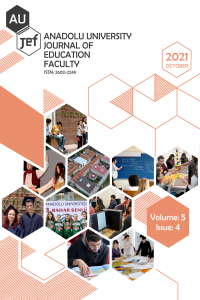Abstract
With the impact of globalization, the exchange of information between people is increasing and learning mobility is accelerating with internationally organized projects. When the activities within the scope of international mobility are evaluated, it is seen that Erasmus projects are pioneers in this field. In addition to ensuring equality of opportunity and opportunity, these projects aim to increase the level of education of member and candidate countries of the European Union. In recent years, these projects have become the center of informal learning activities organized internationally. Turkey is among the countries participating in Erasmus projects. One of the projects Turkey participated in as a participant in Erasmus is the "Listen, Feel, Communicate" [Dinle, Hisset, İletişim Kur] project in Romania. The participating countries of the project are Italy, Spain, Lithuania, Romania and Turkey. Project participants majored in teaching and other social sciences. The research group consists of six teachers selected from the groups in the participating countries in the project. This research aims to describe how the teachers participating in the project make sense of themselves as youth employees and contribute to the professional development of the project. This study is a qualitative research in phenomenology design. Content analysis was performed to reveal the findings of the study. As a result of the research, the participants were able to become youth employees, and they were able to play voluntary, critical, active, self-reliant and innovative roles. In addition, it has been concluded that the experiences in the project process provide teachers with a new language and fun learning environment, improve the technology skills of teachers and increase their knowledge in the field of communication which is the subject of the project through informal learning. The research recommends increasing international projects, disseminating project achievements with post-project activities, and improving participants' English levels.
References
- Absalom, R. (1990). Practical rather than declamatory co-operation: Erasmus in 1990, an appraisal, European Journal of Education, 25 (1), pp. 39-54.
- Akturan, U. ve Esen, A.(2008). Fenomenoloji (ss. 83-98), Nitel araştırma yöntemleri (Editörler: Baş, T. ve Akturan, U.). Ankara: Seçkin Yayıncılık.
- Cervelló Collazos, J. and Guardia González, S. (2008). Évaluation de la satisfaction des étudiants européens ayant participé au programme R.E.S.O. In M. J. Berger & R. Forgette-Giroux (Eds.), Bilan et perspectives. Coopération entre l'Union européenne et le Canada dans la formation des enseignantes et des enseignants. (pp. 55-67): [Brossard?]: Éditions La Périchole.
Abstract
Küreselleşmenin etkisiyle insanlar arasındaki bilgi alışverişi artmakta ve uluslararası düzenlenen projeler ile öğrenme hareketliliği hız kazanmaktadır. Uluslararası hareketlilik kapsamındaki etkinlikler değerlendirildiğinde Erasmus projelerinin bu alanda öncü olduğu görülmektedir. Bu projeler, fırsat ve imkân eşitliğini sağlamanın yanı sıra Avrupa Birliği’ne üye ve aday ülkelerin eğitim seviyesini de yükseltmeyi amaçlamaktadır. Son yıllarda bu projeler, uluslararası alanda düzenlenen informal öğrenme etkinliklerinin merkezi haline gelmiştir. Türkiye de Erasmus projelerine katılım gösteren ülkeler arasındadır. Türkiye’nin Erasmus kapsamında katılımcı olarak dâhil olduğu projelerden biri de Romanya’da gerçekleştirilen “Listen, Feel, Communicate” [Dinle, Hisset, İletişim Kur] adlı projedir. Projenin katılımcı ülkeleri; İtalya, İspanya, Litvanya, Romanya ve Türkiye’dir. Proje katılımcıları; öğretmenlik ve diğer sosyal bilimler alanlarından mezun olmuşlardır. Araştırma grubu, projedeki beş ülke grubundan seçilen altı öğretmenden oluşmaktadır. Bu araştırma, projeye katılan öğretmenlerin kendilerini gençlik çalışanı olarak nasıl anlamlandırdığını ve projenin mesleki gelişimlerine katkısını betimlemeyi amaçlamaktadır. Bu çalışma, fenomenoloji deseninde nitel bir araştırmadır. Araştırmada bulguları ortaya çıkarmak için içerik analizi yapılmıştır. Araştırma sonucunda katılımcılar, gençlik çalışanı olmayı; gönüllü, eleştirel, hareketli, öz güveni yüksek ve yenilikçi roller ile betimlemiştir. Ayrıca proje sürecindeki deneyimlerin öğretmenlere yeni dil ve eğlenceli öğrenme ortamı sağladığı, öğretmenlerin teknoloji becerilerini geliştirdiği ve informal öğrenme yolu ile proje konusu olan iletişim alanındaki bilgilerini artırdığı sonucuna ulaşılmıştır. Araştırma, uluslararası projelerin artırılmasını, proje kazanımlarının proje sonrasında etkinliklerle yaygınlaştırılmasını ve katılımcıların İngilizce seviyelerinin geliştirilmesini önermektedir.
Keywords
References
- Absalom, R. (1990). Practical rather than declamatory co-operation: Erasmus in 1990, an appraisal, European Journal of Education, 25 (1), pp. 39-54.
- Akturan, U. ve Esen, A.(2008). Fenomenoloji (ss. 83-98), Nitel araştırma yöntemleri (Editörler: Baş, T. ve Akturan, U.). Ankara: Seçkin Yayıncılık.
- Cervelló Collazos, J. and Guardia González, S. (2008). Évaluation de la satisfaction des étudiants européens ayant participé au programme R.E.S.O. In M. J. Berger & R. Forgette-Giroux (Eds.), Bilan et perspectives. Coopération entre l'Union européenne et le Canada dans la formation des enseignantes et des enseignants. (pp. 55-67): [Brossard?]: Éditions La Périchole.
Details
| Primary Language | Turkish |
|---|---|
| Subjects | Studies on Education |
| Journal Section | Research Article |
| Authors | |
| Publication Date | October 21, 2021 |
| Published in Issue | Year 2021 Volume: 5 Issue: 4 |
Cited By
How Do English Language Teachers Reflect on the Erasmus+ Projects They Have Experienced in Their School/Classroom Environments?
Cukurova University Faculty of Education Journal
https://doi.org/10.14812/cuefd.1439913
Systematic Analysis of Special Education Projects in eTwinning
Batman Üniversitesi Yaşam Bilimleri Dergisi
https://doi.org/10.55024/buyasambid.1376133
Anadolu University Journal of Education Faculty (AUJEF)
Phone: +902223350580-3550 E-mail: aujef@anadolu.edu.tr
Website: https://aujef.anadolu.edu.tr/

This work is licensed under a Creative Commons Attribution-NonCommercial-ShareAlike 4.0 International License.


